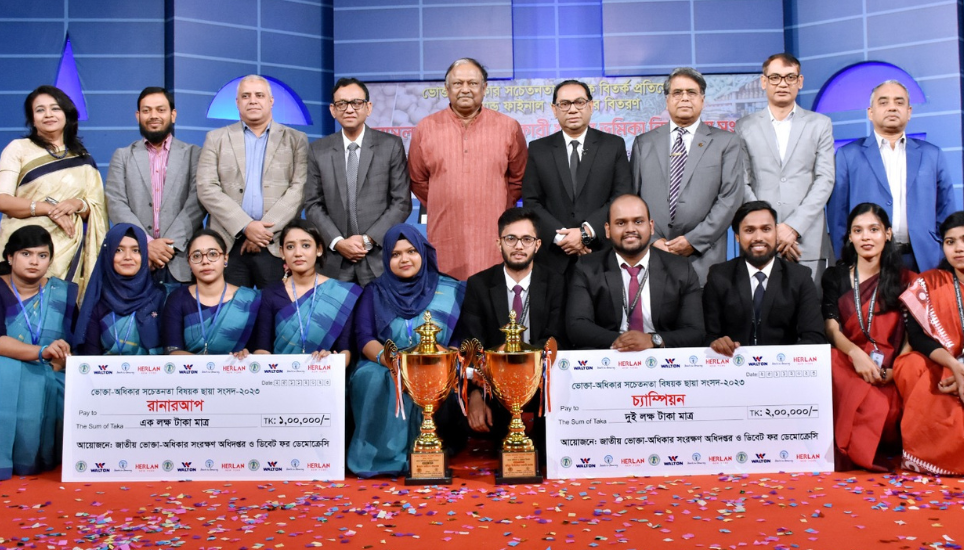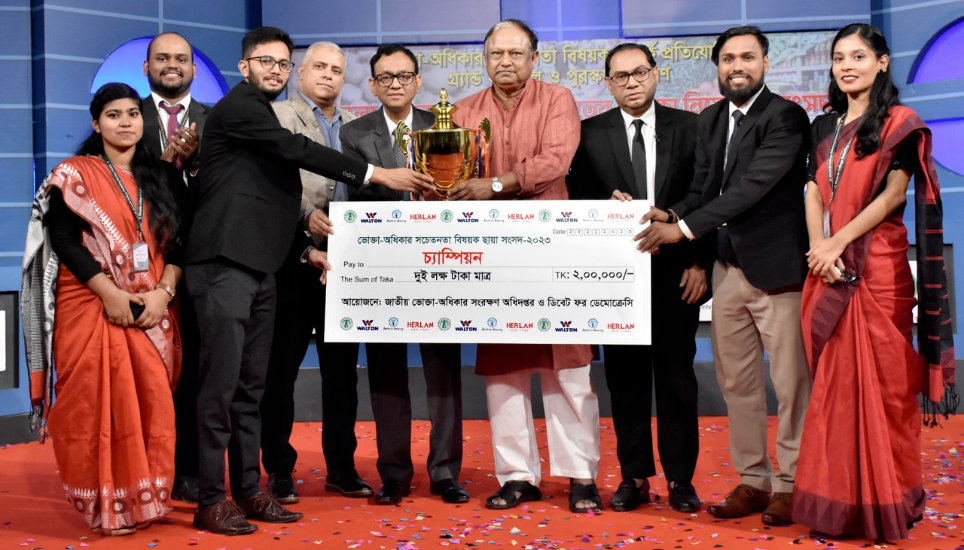
Commerce Minister Tipu Munshi on Saturday said that price control would be a top priority in the upcoming election manifesto of the Bangladesh Awami League.
He made this statement during the grand finale and prize distribution ceremony of the Shadow Parliament on Consumer Rights Protection, a joint initiative of the National Consumer Rights Protection Directorate and Debate for Democracy.

Addressing journalists, Tipu emphasised the government's commitment to the welfare of the people and its efforts to maintain commodity prices at a tolerable level. Acknowledging global challenges, including the Russia-Ukraine war and the aftermath of the Covid-19 pandemic, Tipu highlighted the success of the government in stabilizing prices compared to many other countries worldwide.
To support low-income citizens, the government, under the guidance of Prime Minister Sheikh Hasina, has implemented various programs, including the sale of daily necessities at subsidised prices through entities like the Trading Corporation of Bangladesh (TCB), he said.
In response to questions about importing meat, Tipu clarified that the government has no plans to do so, prioritising the interests of local farmers. “The government has no plan to import meat considering the interests of local farmers. If meat is imported, it is possible to feed the people of the country for Tk400- Tk450. But we have always thought of the farmers of the country to be self-sufficient,” he said.
Discussing challenges in the market, Tipu noted that some unscrupulous traders contribute to price fluctuations, exploiting situations for higher profits. He provided examples, such as the impact of allowing egg imports on market prices and the challenges faced in onion imports from India.

Regarding the sugar market, Tipu explained that despite reducing import duties, the value of the dollar and international market dynamics influence prices. While the government aims to reduce tariffs, fluctuations in the dollar's value have sometimes negated the intended benefits for consumers, he added.
Tipu said that despite the decision to allow imports when egg prices decreased, the market did not stabilise. Importing only 62,000 eggs led to a reduction of Tk 20-30 per dozen. A similar situation occurred with potatoes, indicating sufficient stock in the country. However, some unscrupulous traders are withholding products to exploit the market for higher profits, he said.
Highlighting a shortfall of about 7-8 lakh tonnes of onions compared to demand, Tipu explained the Ministry of Commerce's request to import onions from India. Unfortunately, permission was not granted initially, considering the welfare of local farmers. When imports were eventually allowed, India imposed a 40 per cent tariff, causing onion prices to surge to $800 per tonne, making it challenging for the government to maintain a fixed price.
Discussing the persistently high price of sugar despite a reduction in import duty, the commerce minister clarified that the value of the dollar and international market dynamics were beyond their control. While the government aimed to lower prices by reducing import duties, the increase in the dollar's value counteracted the intended benefits, resulting in no relief for consumers.
Tipu urged consumers to be aware and protest, emphasising that no force could withstand the united strength of the common people. He encouraged consumers to be vigilant, asserting that united public awareness could significantly impact market dynamics.
The ceremony, presided over by Hasan Ahmed Chowdhury Kiran, chairman of Debate for Democracy, featured a speech by AHM Safikuzzaman, director general of the National Consumer Rights Protection Directorate. The event included a final competition between Eden Women's College and Comilla Victoria College, with Cumilla Victoria College emerging as the winner.
Product price control will be prioritised in the election manifesto of Bangladesh Awami Leagues’ election manifesto said commerce minister Tipu Munshi.
He said this in response to a question from the journalists at the grand finale and prize distribution ceremony of the Shadow Parliament on Consumer Rights Protection, shadow parliament on a joint initiative of the National Consumer Rights Protection Directorate and Debate for Democracy.
Tipu Munshi said, “Awami League works for the welfare of the people of the country. The government has continued its efforts to keep commodity prices at a tolerable level. 100 per cent may not be possible in the global context but, we have success compared to many countries of the world.”
“Considering the low-income people, the government is conducting the sale of daily necessities at low prices through various programs including TCB on the instructions of Prime Minister Sheikh Hasina which the government issubsidising thousands.”
In the context of global instability including the Russia-Ukraine war after Corona, the prices of products have increased abnormally in different countries of the world, which has also affected economy of Bangladesh. He also mentioned that the joint role of public and private sector is important in controlling the commodity price market.
In response to the question whether meat will be imported in the country, the commerce minister said, “The government has no plan to import meat considering the interests of local farmers. If meat is imported, it is possible to feed the people of the country for Tk400- Tk450. But we have always thought of the farmers of the country to be self-sufficient.”
In response to another question from the journalists, TipuMunshi said, “After the price of eggs was determined, the market did not come under control when the decision was taken to allow the import, if the price of eggs decreased.
“After importing only 62,000 eggs, prize reduced has reduced Tk20-30each dozen. Same is the case with potatoes. This means that the country has sufficient stock of the product. But some unscrupulous traders are not marketing for the greed of high profits.”
“There is a shortfall of about 7-8 lakh metric tonnes of onion compared to the demand in the country which we import from India. Ministry of Commerce wrote a letter to the Ministry of Agriculture asking for permission to import onions, but permission was not given considering the farmers,” he said.
“Later when imports were allowed, India imposed a 40 percent tariff on imports. A few days later, the export of onions increased to $800 per metric ton due to which the government could not maintain the fixed price.”
Regarding the price of sugar not reducing despite the reduction in import duty, the commerce minister said, "The value of the dollar is not under our control. The goods to be imported depend on the international market or the value of the dollar. We cannot put a price on them even if we wanted to. What we can do is to reduce tariffs. For example, it has been decided to reduce the import duty to reduce the price of sugar. But due to the increase in the dollar, the prices have not had any effect but have increased. As a result, the consumer did not get the benefit.”
The commerce minister said, "Neither the government nor the syndicate is strong. The People's Syndicate is the most powerful. Consumers should be aware and protest. No force can survive if the common people are united. This initiative will play an important role in making people aware.”
Chairman of Debate for Democracy Hasan Ahmed ChowdhuryKiran presided over the function as a special guest; Director General of National Consumer Rights Protection Directorate AHM Safikuzzaman gave speech as special guest. Eden Women's College and Comilla Victoria College contested the final and Comilla Victoria College won.